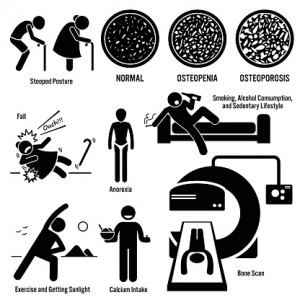Is an Ideal Body Weight Always Accurate?
Determining your ideal body weight can be as easy as looking for your height and weight on a graph, but the number you find is just the first step in determining what range is healthiest for your body type and lifestyle.
As is often the case with figures plucked from a graph, the information is a static set of numbers, and provides only part of the picture needed to figure out an accurate ideal body weight.
Ideal Body Weight
An ideal body weight range is widely accepted as a BMI (Body Mass Index) of 18.5 to 24.9. BMI is a calculation which figures height as it relates to weight.
This means an average woman who is 5'4" can safely weigh between 108 and 145 pounds and be considered at her ideal body weight. Factors which may change and influence this range include age, body composition and activity level. For example, frame size is often used to more accurately pinpoint at what BMI a person would be most healthy.
Frame Size
An easy and fairly accurate test to determine your frame size is wrapping your index finger and thumb around your wrist at its smallest circumference. If your fingers overlap, your frame size is small. If your fingers barely touch, your frame size is medium, and if your fingers do not touch, your frame size is large.
An individual with a large frame size would generally be more comfortable at the upper reaches of her recommended weight range. So the woman referenced above would typically be healthiest at a weight closer to 145 pounds than she would at 108, if it was determined she possessed a large frame.
Age
An additional factor to consider when determining your ideal body weight is your age. Generally speaking, as we get older, the weight at which we can safely live increases slightly. This means a woman in her fifties can weigh 10 to 15 pounds more than her twenty-year-old daughter of the same height, and enjoy the same quality of health.
Activity Level
A final characteristic to consider when determining your correct ideal body weight is your activity level. While most of us do not engage in extreme levels of fitness (like bodybuilding or ultra-marathons), many people enter into much more active lifestyles when they decide to lose weight, and this high level of activity continues once they have reached their goal weight.
To properly support an athletic lifestyle, it is important to remember that the additional muscle mass created as a result of daily exercise may increase the weight at which your body will function best (and may require that you increase your calorie intake to compensate).
Considering additional factors when figuring out your ideal body weight serves not only to allow you to make the best decisions regarding how much weight you need to lose, but also makes the transition to a healthier lifestyle a much easier process.
Fully investigating your lifestyle will prevent you from striving for a goal weight that may be unhealthy for your particular type of body and will make it easier to maintain your weight once you have reached your goal.
-
9 Ways to Fight Your Fear of the Scale and Still Lose Weight
9 Ways to Fight Your Fear of the Scale and Still Lose Weight Alth
-
Belly Busters
If you walk down the streets today, there won抰 be a minute that p
-
Fat – The Misconceptions About the “Good” Fat
The Misleading Factor About Fat Over the
-
4 Steps To A New Lifestyle For A Slimmer Healthier Happier YOU
So you want to lose weight to look better and feel better. You are not
-
Are Weight Loss Testimonials For Real?
Weight loss tips are almost omnipresent, with everyone having their 2
-
Everyday Exercise Schedules: The Confident Tactic to Get Fit
Even though it is properly okay to invest two or perhaps three days an
- DON'T MISS
- The 10 Laws of Fat Loss!
- Hybrid Hype and a Small Price Hike
- Introducing The Healthy Weight Loss Club
- Setting Smart Goals for Weight Loss Success
- Are You Influenced by Your Husband’s Choices?
- The Scan of True Love
- Whats the Deal with Detox Diets?
- How To Choose The Best Weight Loss Program In The Northwest Suburbs Of Chicago, Il
- Your Guide For Quick Free Weight Loss
- 30 must do’s to get the body you want!!




